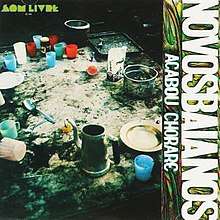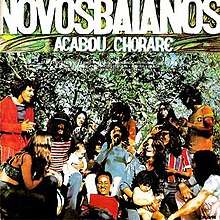Acabou Chorare
Acabou Chorare (No More Crying in English) is the second studio album by the Brazilian musical group Novos Baianos. The album was released in 1972 by Som Livre, following the group's somewhat successful debut É Ferro na Boneca (1970). The group adopted the expressive guitar of Jimi Hendrix and the "brasilidade" of Assis Valente, and was heavily influenced by João Gilberto, who served as the group's mentor during the album's recording.
| Acabou Chorare | ||||
|---|---|---|---|---|
 | ||||
| Studio album by | ||||
| Released | 1972 | |||
| Recorded | 1972 | |||
| Genre | ||||
| Length | 39:31 | |||
| Label | Som Livre | |||
| Producer |
| |||
| Novos Baianos chronology | ||||
| ||||
| Alternate cover | ||||
 | ||||
Its opening track, "Brasil Pandeiro", was suggested by Gilberto and is one of two sambas (along with "Recenseamento"), which Valente composed for the arrival of Carmen Miranda to the United States. The album title and its title track were inspired by Gilberto's Bossa nova style, and by a story he told the group about his daughter. The song lays out the main idea of the album: to criticize the sadness and melancholy that were on display in contemporary Brazilian music, and to replace them with joyfulness and pleasure. Some of the album's most successful songs include "Preta Pretinha", "Besta É Tu" and "Tinindo Trincando".
40 years after its release, the album continues to be one of the most popular and influential of Brazilian music in general. Later generations of Brazilian singers, like Vanessa da Mata, Marisa Monte, CéU, Roberta Sá and Mariana Aydar, cite the album as one of their strongest inspirations. In 2007, in "The 100 Greatest Albums of Brazilian Music" by Rolling Stone, Acabou Chorare came in first, being considered a masterpiece by the specialists, producers and journalists who were asked for their opinions.[1] On September 2012, it was elected by the audience of Radio Eldorado FM, of Estadao.com e of Caderno C2+Música (both the latter belong to newspaper O Estado de S. Paulo) as the eight best Brazilian album ever, tied with Secos & Molhados, by the band of same name.[2]
Reception
| Review scores | |
|---|---|
| Source | Rating |
| Allmusic | |
Acabou Chorare includes some of Novos Baianos' most popular hits. The title track, for example, was broadcast on Brazilian radio for 30 consecutive weeks. "Preta, Pretinha" is the most requested song by Novos Baianos fans[3] and it was voted by the Brazilian edition of Rolling Stone as the 20th greatest Brazilian song.[4] "Brasil Pandeiro" and "Mistério do Planeta" are also popular.
Legacy
The album has influenced many Brazilian musicians and bands. The absence of a hierarchy within the group inspired many bands, such as Orquestra Imperial and Tribalistas, to take a similar approach. The focus on samba rhythm was the basis for the music of Vanessa da Mata and Roberta Sá. João Gilberto, who was a major influence in the making of the album, was himself influenced by it and its creators.[3]
Track listing[5]
| # | Title | Songwriters | Length |
| 1. | "Brasil Pandeiro" | Assis Valente | 3:55 |
| 2. | "Preta, Pretinha" | Moraes Moreira, Luiz Galvão | 6:37 |
| 3. | "Tinindo, Trincando" | Moraes Moreira, Luiz Galvão | 3:24 |
| 4. | "Swing de Campo Grande" | Paulinho Boca de Cantor, Moraes Moreira, Luiz Galvão | 3:09 |
| 5. | "Acabou Chorare" | Luiz Galvão, Moraes Moreira | 4:13 |
| 6. | "Mistério do Planeta" | Moraes Moreira, Luiz Galvão | 3:37 |
| 7. | "A Menina Dança" | Moraes Moreira, Luiz Galvão | 3:52 |
| 8. | "Besta É Tu" | Moraes Moreira, Pepeu Gomes, Luiz Galvão | 4:24 |
| 9. | "Um Bilhete para Didi" | Jorginho Gomes | 2:52 |
| 10. | "Preta, Pretinha" | Moraes Moreira, Luiz Galvão | 3:24 |
The song "Um Bilhete para Didi" is performed by the backup band A Cor do Som.
Personnel[5]
- Moraes Moreira: vocals (in "Brasil Pandeiro", "Preta, Pretinha", "Acabou Chorare" and "Besta É Tu") and acoustic guitar
- Baby Consuelo: vocals (in "Brasil Pandeiro", "Tinindo, Trincando" and "A Menina Dança"), cabasa, triangle and maracas
- Paulinho Boca de Cantor: vocals (in "Brasil Pandeiro", "Swing de Campo Grande" and "Mistério do Planeta") and tambourine
- Pepeu Gomes: electric guitar, acoustic guitar and craviola
- Jorginho: cavaquinho
- Baixinho: bass drum
- Dadi: bass
- Bolacha: bongos
References
- Matias, Alexandre (October 2007). "Os 100 Maiores Discos da Música Brasileira - Acabou Chorare - Novos Baianos (1972, Som Livre)". Rolling Stone Brasil (in Portuguese). Spring. Retrieved 28 January 2016.
- Bomfim, Emanuel (7 September 2012). "'Ventura' é eleito o melhor disco brasileiro de todos os tempos". Combate Rock (in Portuguese). Grupo Estado. Retrieved 28 January 2016.
- Preto, Marcus. "Os 100 maiores discos da música brasileira". Rolling Stones (in Portuguese). Archived from the original on 16 June 2010.
- Lauro, Marcos (2009). "As 100 Maiores Músicas Brasileiras - "Preta Pretinha"". Rolling Stone Brasil (in Portuguese). Spring. Retrieved 6 January 2014.
- "Acabou Chorare: Novos Baianos". Discos do Brasil (in Portuguese). Retrieved 13 December 2009.